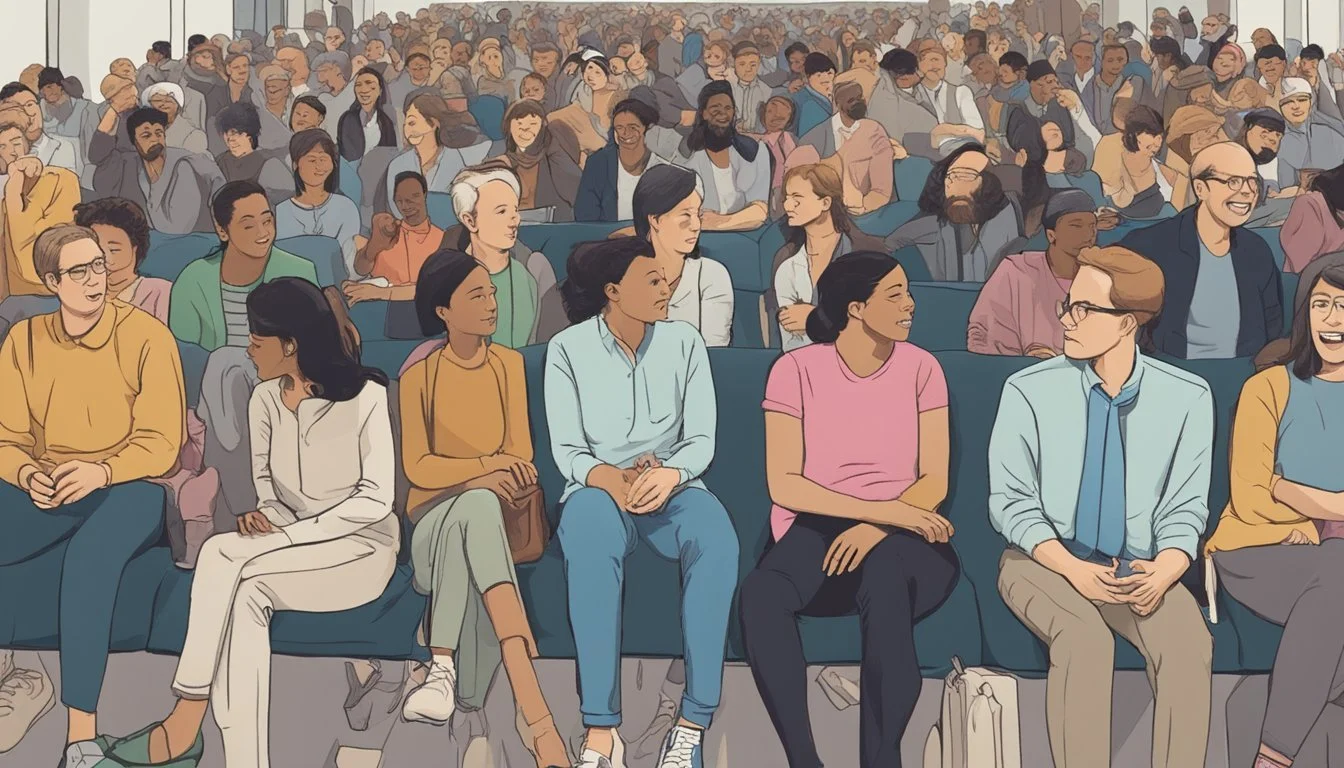7 Techniques for Introverts to Manage Social Anxiety
Effective Strategies for Calm Interactions
Social anxiety can be particularly challenging for introverts, who often prefer quieter environments and smaller social gatherings. Many introverts experience heightened stress and discomfort in social situations, leading to avoidance behaviors that can impact their personal and professional lives.
Fortunately, there are effective techniques introverts can use to manage social anxiety and feel more at ease in social settings. By implementing specific strategies, introverts can build confidence, reduce anxiety symptoms, and navigate social interactions more comfortably. This article explores seven practical approaches that can help introverts cope with social anxiety and improve their overall quality of life.
1) Practice Deep Breathing
Deep breathing is a powerful technique for introverts to manage social anxiety. This simple yet effective method helps calm the nervous system and reduce stress in social situations.
One popular approach is the 4-7-8 breathing technique. Inhale through the nose for 4 seconds, hold the breath for 7 seconds, and exhale slowly for 8 seconds. This pattern can be repeated several times to promote relaxation.
Another beneficial method is diaphragmatic breathing. Introverts can place one hand on their chest and the other on their stomach, focusing on breathing deeply into the abdomen rather than the chest.
Practicing deep breathing exercises regularly can help introverts feel more prepared for social interactions. By incorporating these techniques into their daily routine, they can develop a habit of relaxation that carries over into anxiety-inducing situations.
Before entering a social event, taking a few moments to engage in deep breathing can significantly reduce anxiety symptoms. This practice helps introverts feel more centered and composed, allowing them to approach social situations with greater ease.
2) Start with Small Gatherings
Introverts with social anxiety often find large social events overwhelming. Starting with small gatherings can be an effective strategy to manage these feelings and build confidence.
Small groups provide a more intimate setting, allowing for deeper conversations and easier connections. These environments typically have fewer stimuli, reducing sensory overload that can trigger anxiety.
Choosing gatherings with just a few close friends or family members can create a comfortable atmosphere. This familiarity can help introverts feel more at ease and practice social skills without excessive pressure.
Hosting a small get-together at home gives introverts control over the environment and guest list. This control can significantly reduce anxiety and increase comfort levels.
Gradually increasing the size of social gatherings over time can help build tolerance for larger events. This step-by-step approach allows introverts to expand their social circles at their own pace.
Focusing on quality interactions rather than quantity can be particularly beneficial. Meaningful conversations in small groups often align better with introverts' preferences and strengths.
3) Use Positive Visualization
Positive visualization can be a powerful tool for introverts to manage social anxiety. This technique involves imagining successful social interactions and positive outcomes before they occur.
By mentally rehearsing social scenarios, introverts can build confidence and reduce anxiety. They can visualize themselves engaging in conversations, feeling relaxed, and enjoying social events.
Regular practice of positive visualization can help rewire the brain to expect positive outcomes rather than negative ones. This shift in mindset can lead to decreased anxiety and increased comfort in social situations.
Introverts can start by setting aside a few minutes each day to visualize upcoming social interactions. They should focus on specific details, such as their body language, tone of voice, and the positive reactions of others.
Combining visualization with deep breathing exercises can enhance its effectiveness. This pairing can help calm nerves and reinforce positive mental imagery.
Over time, positive visualization can contribute to improved social confidence and reduced anxiety for introverts. It provides a mental foundation for more comfortable and enjoyable social experiences.
4) Prepare Conversation Topics
Introverts can ease social anxiety by preparing conversation topics in advance. This strategy helps reduce uncertainty and provides a mental safety net for social interactions.
Keeping up with current events, popular culture, and local happenings can provide a wealth of conversation starters. Introverts might consider making a mental list of 3-5 topics they feel comfortable discussing.
Asking open-ended questions about others' interests, work, or hobbies can shift the focus away from oneself and encourage engaging dialogue. This approach allows introverts to participate without feeling pressured to constantly contribute.
Practicing these topics alone or with a trusted friend can build confidence. Rehearsing potential responses and follow-up questions can make conversations feel more natural and less daunting.
Remember that most people enjoy talking about themselves. Showing genuine interest in others' experiences and opinions can lead to meaningful exchanges and alleviate social anxiety.
5) Take Breaks During Events
Introverts can effectively manage social anxiety by incorporating strategic breaks during events. Stepping away from social interactions periodically allows for necessary recharging time.
Finding a quiet spot or stepping outside for fresh air can provide much-needed respite. Even a short 5-10 minute break can help reset and regain energy for further socializing.
Using the restroom or offering to grab drinks for others are natural ways to take brief pauses. These temporary escapes give introverts a chance to collect their thoughts and decompress.
Setting a phone alarm as a reminder to take breaks can be helpful. This ensures regular opportunities to step away without losing track of time.
Introverts may find it beneficial to alternate between socializing and taking breaks. This approach helps maintain energy levels throughout an event while still participating fully.
6) Focus on Active Listening
Active listening is a powerful technique for introverts to manage social anxiety. By concentrating on the speaker's words, introverts can shift their focus away from internal worries and onto the conversation at hand.
This approach involves giving full attention to the speaker, observing non-verbal cues, and responding thoughtfully. Introverts can use their natural inclination for deep reflection to their advantage in these situations.
Practicing active listening allows introverts to engage meaningfully without feeling pressured to constantly speak. It provides an opportunity to gather information and formulate considered responses.
To improve active listening skills, introverts can maintain eye contact, nod occasionally, and use brief verbal affirmations. These actions demonstrate engagement and encourage the speaker to continue.
Reflecting on what has been said and asking relevant questions can further enhance the conversation. This technique not only helps manage anxiety but also fosters deeper connections with others.
By mastering active listening, introverts can leverage their strengths and contribute valuably to social interactions. This skill builds confidence and reduces the stress often associated with social situations.
7) Set Realistic Social Goals
Setting achievable social goals is crucial for introverts managing social anxiety. By starting small and gradually increasing challenges, individuals can build confidence and reduce overwhelming feelings.
Introverts can begin with simple objectives like initiating a brief conversation with a coworker or attending a social event for a short duration. These modest goals provide opportunities to practice social skills without excessive pressure.
Using the SMART framework (Specific, Measurable, Achievable, Relevant, Time-bound) can help in crafting effective goals. For example, "I will attend a 30-minute coffee meetup with two colleagues this week" is a clear and attainable target.
Breaking down larger social goals into smaller steps makes them less daunting. Instead of aiming to become the life of the party, focus on making one new acquaintance at each gathering.
Regularly monitoring progress and celebrating small victories reinforces positive behaviors and motivates continued effort. Keeping a journal of social interactions and personal growth can provide valuable insights and encouragement.
Understanding Social Anxiety
Social anxiety is a common challenge for introverts, characterized by intense fear and discomfort in social situations. It can manifest through physical symptoms and negative thought patterns. Understanding its nature and underlying causes is crucial for developing effective coping strategies.
What Is Social Anxiety?
Social anxiety disorder involves an intense, persistent fear of being watched and judged by others. It goes beyond typical shyness or nervousness in social settings. People with social anxiety may experience extreme self-consciousness and worry about embarrassing themselves.
This condition can affect various aspects of daily life, including work, school, and personal relationships. Social anxiety often leads to avoidance behaviors, where individuals skip social events or interactions to prevent discomfort.
While both introverts and extroverts can experience social anxiety, introverts may be more prone due to their preference for less social stimulation. However, introversion and social anxiety are distinct traits that don't always co-occur.
Symptoms and Causes
Common symptoms of social anxiety include:
Rapid heartbeat
Sweating
Trembling
Difficulty speaking
Nausea
Blushing
These physical reactions are often accompanied by negative thoughts and fear of judgment. Social anxiety can stem from various factors:
Genetics: Family history may increase susceptibility
Brain structure: Overactivity in the amygdala can contribute
Environment: Negative social experiences or parenting styles
Personality: Shy or introverted tendencies may play a role
Traumatic events or prolonged stress can also trigger or exacerbate social anxiety. Understanding these root causes helps in developing targeted coping strategies and seeking appropriate treatment when necessary.
The Role of Introversion
Introversion shapes how individuals experience and navigate social situations. It influences energy levels, preferred environments, and coping mechanisms for social anxiety.
Introversion vs. Social Anxiety
Introversion and social anxiety are distinct traits, though they can overlap. Introverts prefer solitude and smaller gatherings, finding them energizing. Social anxiety, however, stems from fear of judgment in social settings.
Introverts may enjoy social interactions in limited doses. They typically feel drained after extended social contact and need alone time to recharge. Social anxiety sufferers, regardless of introversion or extroversion, experience intense worry about social situations.
Some introverts develop social anxiety due to societal pressure to be more outgoing. This can lead to self-doubt and discomfort in social settings. Recognizing the difference between introversion and social anxiety is crucial for developing effective coping strategies.
Advantages of Being an Introvert
Introverts possess unique strengths that can aid in managing social anxiety. Their natural inclination for self-reflection often leads to heightened self-awareness. This trait helps them identify anxiety triggers and develop personalized coping mechanisms.
Introverts excel at deep, one-on-one conversations. This skill can reduce anxiety in social situations by fostering meaningful connections. Their ability to listen attentively makes them valued friends and colleagues.
The introvert's preference for quiet environments can be leveraged to create calming routines. These practices, such as reading or meditation, help manage anxiety symptoms. Introverts often have rich inner worlds, allowing them to find fulfillment in solitary pursuits.
Embracing these introverted qualities can boost confidence and reduce social anxiety over time.
Self-Care Strategies
Effective self-care practices can significantly reduce social anxiety for introverts. These techniques help create a sense of calm and foster personal boundaries.
Mindfulness and Relaxation Techniques
Mindfulness meditation can be a powerful tool for introverts to manage social anxiety. By focusing on the present moment, individuals can reduce stress and overthinking.
Deep breathing exercises are simple yet effective. Inhaling for 4 counts, holding for 4, and exhaling for 4 can quickly calm the nervous system.
Progressive muscle relaxation involves tensing and releasing different muscle groups. This practice helps introverts become more aware of physical tension and release it.
Guided imagery uses mental visualization to create a sense of peace. Imagining a calm, safe place can provide relief from anxiety symptoms.
Establishing Personal Boundaries
Setting clear boundaries is crucial for introverts to manage social energy and reduce anxiety. Learning to say "no" to non-essential commitments preserves mental resources.
Creating a balanced social calendar allows for necessary alone time. Introverts can schedule social activities with built-in recovery periods.
Communicating needs to friends and family helps prevent overwhelm. Expressing preferences for smaller gatherings or quieter environments can lead to more enjoyable social experiences.
Designating a personal retreat space at home provides a sanctuary for recharging. This area can be used for relaxation, hobbies, or simply unwinding after social interactions.






